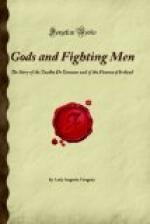Dr Atkinson is an Englishman, but unfortunately not only fellow-professors in Trinity but undergraduates there have been influenced by his opinion, that Irish literature is a thing to be despised. I do not quote his words to draw attention to a battle that is still being fought, but to explain my own object in working, as I have worked ever since that evidence was given, to make a part of Irish literature accessible to many, especially among my young countrymen, who have not opportunity to read the translations of the chief scholars, scattered here and there in learned periodicals, or patience and time to disentangle overlapping and contradictory versions, that they may judge for themselves as to its “lowness” and “want of imagination,” and the other well-known charges brought against it before the same Commission.
I believe that those who have once learned to care for the story of Cuchulain of Muirthemne, and of Finn and Lugh and Etain, and to recognise the enduring belief in an invisible world and an immortal life behind the visible and the mortal, will not be content with my redaction, but will go, first to the fuller versions of the best scholars, and then to the manuscripts themselves. I believe the forty students of old Irish lately called together by Professor Kuno Meyer will not rest satisfied until they have explored the scores and scores of uncatalogued and untranslated manuscripts in Trinity College Library, and that the enthusiasm which the Gaelic League has given birth to will lead to much fine scholarship.
A day or two ago I had a letter from one of the best Greek scholars and translators in England, who says of my “Cuchulain”: “It opened up a great world of beautiful legend which, though accounting myself as an Irishman, I had never known at all. I am sending out copies to Irish friends in Australia who, I am sure, will receive the same sort of impression, almost an impression of pride in the beauty of the Irish mind, as I received myself.” And President Roosevelt wrote to me a little time ago that after he had read “Cuchulain of Muirthemne,” he had sent for all the other translations from the Irish he could get, to take on his journey to the Western States.
I give these appreciative words not, I think, from vanity, for they are not for me but for my material, to show the effect our old literature has on those who come fresh to it, and that they do not complain of its “want of imagination.” I am, of course, very proud and glad in having had the opportunity of helping to make it known, and the task has been pleasant, although toil-some. Just now, indeed, on the 6th October, I am tired enough, and I think with sympathy of the old Highland piper, who complained that he was “withered with yelping the seven Fenian battalions.”
II. THE AGE AND ORIGIN OF THE STORIES OF THE FIANNA
Mr Alfred Nutt says in Ossian and the Ossianic Literature, No. 3 of his excellent series of sixpenny pamphlets, Popular Studies in Mythology, Romance, and Folklore:—




